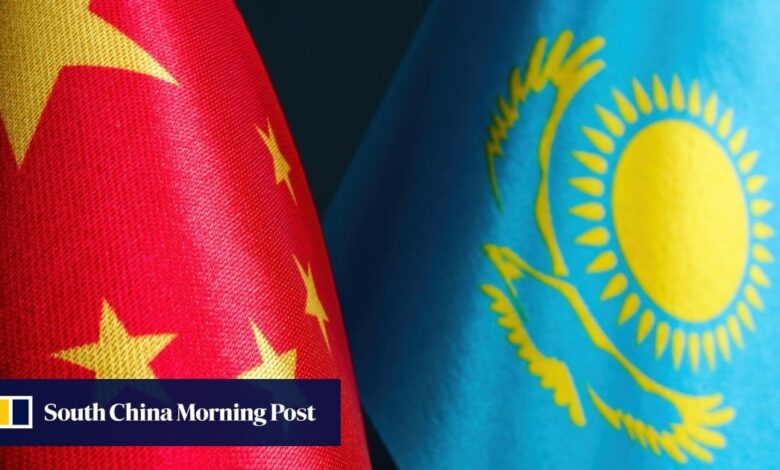China-Kazakhstan to share migration data, closing route for some, including from Xinjiang, keen to bypass Beijing

Maulen Ashimbayev, chair of the senate, said during the senate session that the agreement was necessary for the “fight against dual citizenship”.
The deputy minister of internal affairs, Igor Lepekha, said during the senate session that China required the agreement on exchanging citizen information to be passed as a provision for allowing a visa-free regime between the two nations, according to Kazakhstan-based news agency Zakon.
Beijing agreed during President Tokayev’s visit in May to issue a visa-free policy to Kazakhstan citizens with the information exchange agreement as a condition. The visa-free regime makes Kazakhstan the third country – along with Singapore and Brunei – whose citizens can travel to China without a visa. Chinese citizens have been able to travel to Kazakhstan freely since last year.
“The Chinese side understands that if visa-free travel starts now, the flow of citizens from one side and the other will increase. And in order to primarily control illegal migration, ratification of this agreement is required,” Lepekha said.
Kazakhstan has signed similar agreements to avoid dual citizenship with five other nations: Azerbaijan, Belarus, Kyrgyzstan, Tajikistan and Uzbekistan.
The bill will effectively end a decades-old loophole through which Chinese nationals, mostly from Xinjiang Uygur autonomous region, have circumvented Chinese authorities to become citizens of Kazakhstan.
For some communities wanting to emigrate to Kazakhstan – mostly Kazakhs and Uygurs in Xinjiang – an information-sharing system between the two countries may cause fear because they could face Chinese government inspections, according to Temur Umarov, a fellow at the Russia Eurasia Centre at the Washington-based think tank, Carnegie Endowment for International Peace.
“[The law] will affect specifically those people who are trying to obtain Kazakh passports while they still have [a] People’s Republic of China passport. This includes a lot of people who are based in Xinjiang and want to relocate to Kazakhstan,” Umarov said.
“They are afraid that if Chinese authorities find out they are starting the process of obtaining a Kazakhstan passport, they will have some penalties and other consequences from the government.”
Singapore banks tighten checks on China-born clients with other citizenships
Singapore banks tighten checks on China-born clients with other citizenships
Astana is pledging to crack down on dual citizenship and close its once-accessible immigration pathway. Last year, Tokayev said the problem of dual citizenship was a threat to Kazakhstan’s national security and actively promoted cooperation on the exchange of data on citizenship between the Commonwealth of Independent States (CIS).
According to the Kazakh government, an applicant for Kazakh citizenship should renounce foreign citizenship and hand over the passport of their original nation to an authorised body of that former citizenship country.
But revoking Chinese citizenship has been reportedly difficult in some cases in Xinjiang.
In 2018, Astana said dual passport holder had been detained in China. The foreign ministry said some 170 ethnic Kazakhs were “experiencing difficulties” in China, of which 12 were Kazakhstan citizens and nine had since returned to Kazakhstan.
The ministry said those detained had not been able to “properly complete the documentation for revoking their Chinese citizenship”.
But Umarov believed the major purpose of the agreement was to complete the steps necessary for establishing a visa-free regime to crack down on dual citizenship.
Zhu Yongbiao, a professor at the School of Politics and International Relations at China’s Lanzhou University, said both Beijing and Astana were trying to combat the issue of dual citizenship to maintain security and stability in the region, especially as the visa-free regime was imminent.
Zhu said dual-nationality status had caused social problems in Kazakhstan because the increasing number of migrants was competing with local people in the job market and for social welfare.
He said cross-border crimes, especially smuggling, cast a bigger shadow on the two countries with organised criminals using the dual-citizenship loophole to avoid police from both China and Kazakhstan.
“There have been cases that some Chinese … should have been sentenced for crimes committed in China, but they entered Kazakhstan legally or illegally, and obtained Kazakh citizenship and thus evaded trial in China,” Zhu said.
“When [Chinese criminals] flee to Kazakhstan and receive Kazakhstan citizenship, the Kazakhstan government will have a dispute with the Chinese government over its treatment of the criminals, which has sometimes escalated to diplomatic disputes,” he added.
The dual-citizenship issues in Kazakhstan derive from the last century when Astana encouraged ethnic Kazakhs from different countries to immigrate to their “historic motherland” after the country gained independence from the Soviet Union in 1991 and was eager to establish a predominantly Kazakh nation-state.
Chinese diplomats complain to Russia after influencer denied entry
Chinese diplomats complain to Russia after influencer denied entry
Zhu said that early in that movement Kazakh authorities largely ignored illegal dual citizenship issues to attract more Kazakhs, and to draw Kazakhs and Uygurs to emigrate from Xinjiang in China to neighbouring countries.
“However, as the construction of a nation-state has basically been completed, public opinions on dual nationality are growing, now more people do not recognise this issue,” he said.
Zhu added that the number of Chinese migrants to Kazakhstan had “dramatically decreased” in recent years with Chinese Kazakhs finding it difficult to integrate into the local community because of differences in customs, traditions and language, with some encountering “intense conflicts in society”.





